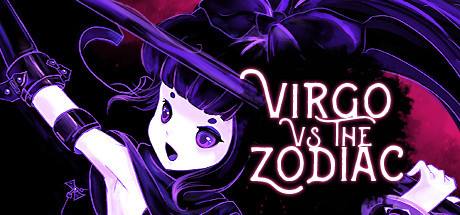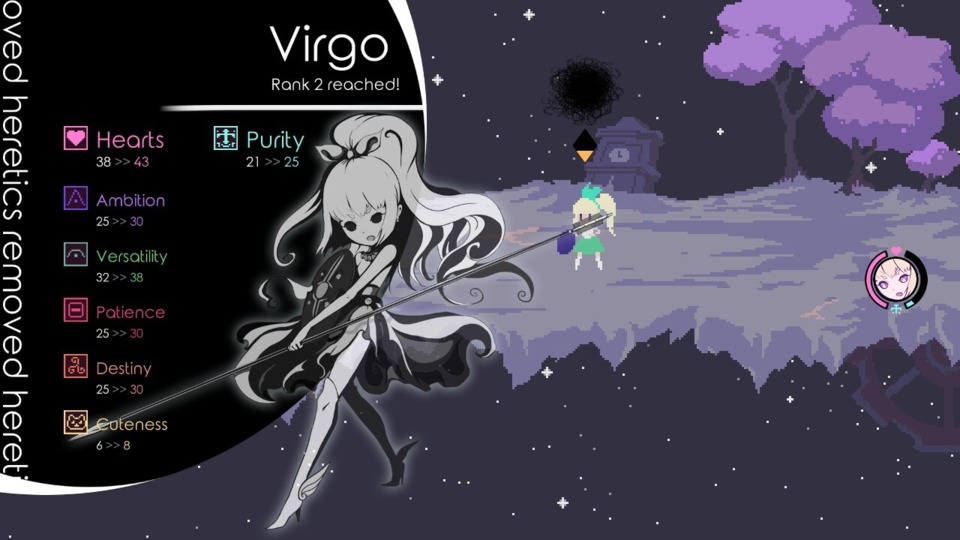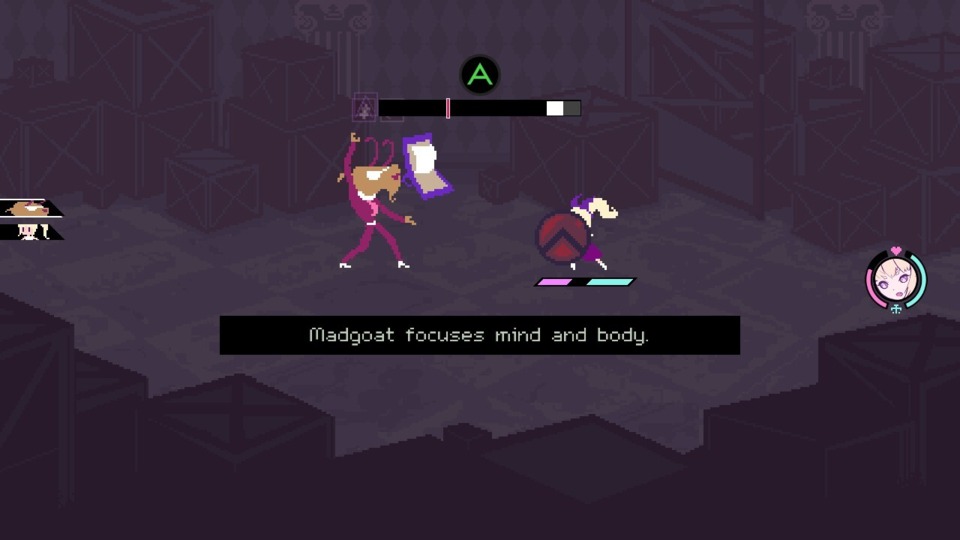
I feel like I should enshrine somewhere the handful of traits I get excited by when perusing my Steam library of all the curious Indies I've picked up. I'm not sure how many times I've opened an entry of this feature by talking about adventure games that figured out whole new ways to tell a story, or how my nostalgic love of 2D explormers and dungeon-crawlers continues to be reflected by small studios the world over to my delight, or how Indie RPGs have taken on the mantle of various classic 16-bit JRPGs but have found ingenious methods to deliver their story beats and tactical combat systems in ways that either feel smartly compact or offer some subversive, iconoclastic, or empathetic new approach to what is all-too-familiar "swords 'n' numbers" territory much like Shigesato Itoi once did back in his day. This week's game, Virgo Versus the Zodiac from Moonana, manages to be the rare Indie RPG that does both.
I've read many sources comparing Virgo Versus the Zodiac to EarthBound, Undertale, and the Mario & Luigi RPGs but I think the most obvious - in direct mechanical comparison terms, if not a game most would instantly recall - is Unproductive Fun Time's 2008 cult RPG Maker hit (and another direct Undertale inspiration source) Off, which I reviewed only a little while back (IGotW #248). Both follow a "pure" - albeit in a vicious and uncompromising sense of the term - protagonist who has set out to purify a very strange cosmos of its corrupt and complacent guardian deities, and obfuscates its relatively straightforward turn-based mechanics with a whole lot of strange lingo and metaphysical conceits. Virgo Versus the Zodiac is naturally based on astrology and stargazing, with each zodiac constellation appearing as a deity of sorts characterized by traits commonly attached to those born with those starsigns, though in exaggerated ways more befitting of a churlish and spiteful pantheon of gods. Virgo herself is an unrepentant zealot seeking to root out "heresy" wherever it may be found, while other zodiacs have distinct villainous characteristics of their own or have otherwise become comparatively more laid-back as the millennia have rolled on.

You start the game with Virgo chasing after Capricorn - fitting, as the goat is the first zodiac sign of the calendar - with very little in the way of backstory provided, except that Virgo is possibly receiving some nebulously-defined support for this crusade of hers from Pisces and/or Gemini. She also has a gingerbread lackey named Gingerbread who is submissive to a fault, whom sort of acts as an audience surrogate as she discusses her plans to take Capricorn's crown through messing around with the engines powering her world. These discussions present the smallest amount of context required in a game that at first offers nought but morsels, but eventually starts to fill in the blanks through flashbacks and necessary exposition. Virgo Versus the Zodiac is very much one of those games that has players work for their narrative crumbs, with Virgo's interactions with the many objects that pepper the 16-bit overworld that occupies Virgo's time outside of battle leading to tidbits of backstory and glances into Virgo's personality, as well as those of her current target and how they and their minions conduct themselves. Capricorn's world, for instance, is heavily influenced by cutthroat corporate culture with her caffeinated caprine constituents working around the clock to produce what appears to be food stock frozen in cubes and shipped to all corners of the cosmos. Later worlds, too, have their own distinct visual flair and themes.
Battles use a bit more detail and graphical panache than the simple-looking overworld, as well-animated enemies tangle with Virgo (and, later, her companions) with a combat system that feels influenced by Bravely Default and other RPG throwbacks that strive to offer a tactical edge more elaborate than using all your best attacks every turn and healing when necessary. One such nuance involves spending a turn guarding to build a defensive buffer stat called "Purity" which drains after every enemy attack in place of that character's health. Characters will also retaliate with counter attacks if their purity is damaged, allowing them to better control battles with multiple opponents by guarding occasionally, building their purity meter, and dishing out multiple counters per turn for as long as it lasts. Of course, a system like that goes both ways: be wary if you strike a foe with some built-up purity, as they might retaliate also and you're never quite sure how hard these rebuttals will hit. (A character's purity also drains when they themselves attack too, if you think you can wait it out rather than risk a devastating counter.)

As with another recent 16-bit throwback RPG with some tactical depth, Happy Ray Games's Ikenfell, there's also a greater emphasis on timed hits: the type of reflexes-based QTE established by the various Mario RPGs that will add a little more mustard to your outgoing attacks while softening those incoming, provided you hit a moving cursor at the right moment. Most games with this feature will only offer small bonuses for perfect timing - say 10% or 20% at most added/subtracted to the original figure - but in Virgo Versus the Zodiac the difference is far more significant and is thus far more integral to the player's chances of winning. The game offers a decent challenge right from the jump: the second compulsory battle (some can be skipped, but many happen as unavoidable part of the story; you have forewarning for almost all of them though, if you need to heal up real fast) has you fight five opponents similar to your own strength across two groups with no pause. Then there's the aforementioned layer of obfuscation from the game's jargon - for instance, the three Fire Emblem-esque damage elements with a rock-paper-scissors relationship are Mutable, Fixed, and Cardinal damage, each enhanced by a different attack stat - and you have a game that takes a little while to warm up to.
However, between Virgo's deliberately obtuse approach to its narrative, from its unusual terminology to its initially withdrawing approach to lore, and this complicated and fairly challenging combat system it's been quite the compelling riddle to solve. It's not without its sense of humor either, filling its worlds with Undertale-esque distractions and side-characters that might offer an unexpected fight or a new item or just some flavor text. New weapons and equipment appear frequently and usually carry a mix of bonuses and maluses, which require carefully considering whether the balance is to your liking, and at least eight different equipment slots to offer a significant amount of customization potential even for a game that has a relatively small amount of items to find: it's not quite like you're constantly comparing the numbers on colored Diablo loot, but nothing comes without a downside either and it's worth considering how your gear synergizes together (a weapon that primarily deals Cardinal damage, for instance, will be more effective if you have equipment that increases the related Ambition stat; not dissimilar to how Souls weapons benefit from stat-scaling). I haven't progressed as far through the game as I would've liked before penning a review, because so much of my final evaluation is going to hang on later story revelations and whatever the party dynamic is like once I find companions to recruit, but from what I've seen so far it's a subversive and cleverly-designed delight that should be right up the alley of anyone who enjoyed how unapologetically surreal Indie RPGs like Undertale and Off were willing to be.
Rating: 4 out of 5. (So far.)
| < Back to 271: Alwa's Legacy | The First 100 | The Second 100 | > Forward to 273: Cardinal Cross |

Log in to comment